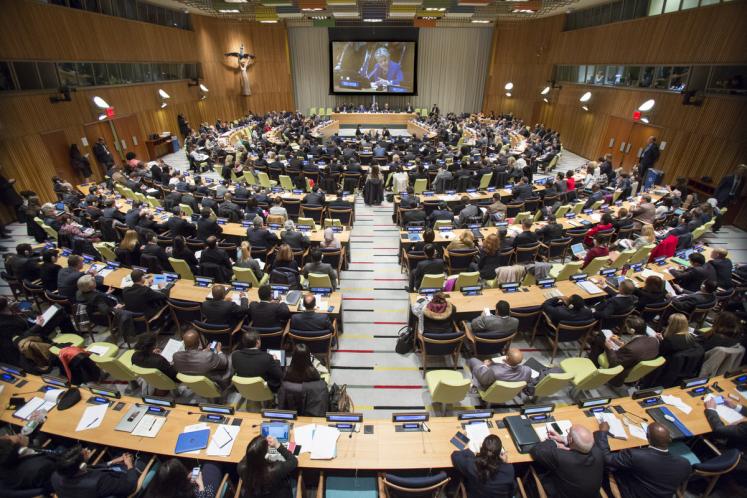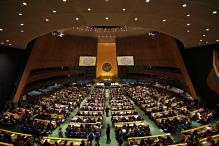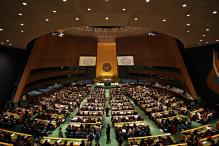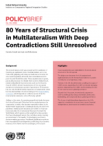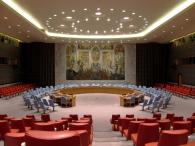For three days this week, the diplomatic corps, and many others around the world, were transfixed by the first ever auditions for the post of UN Secretary-General.
The ‘informal dialogues’, organized by the President of the General Assembly (PGA) following a decision taken last year, were held over three days in the Trusteeship Council. One by one, each of the nine official candidates declared so far presented a 10-minute ‘vision statement’, then took questions from dozens of UN Member States. Each candidate was also presented with two questions recorded by civil society actors around the world, and sent in on video.
All told, around 800 questions were asked. With all 193 Member States present at the hearings, the President of the General Assembly, concluded: ‘For the hardest job in the world, we now have the hardest job interview in the world’.
Who won?
The proceedings started a little tentatively, with Igor Luksic of Montenegro, but warmed up with the next candidate, Irina Bokova of Bulgaria. By the third candidate of the first day, Portugal’s António Guterres, states seemed comfortable with the format. One Permanent Representative said simply, ‘The process is getting better with each candidate.’
Going into the week, I, like many others, thought that the hearings would act more as a hurdle, potentially tripping candidates up, than as springboard to victory. Indeed, some states did try to lay landmines for candidates. Ukraine asked several candidates (notably those thought to be close to Russia) how, as Secretary-General, they would seek to enforce the General Assembly Resolution that called for respect of Ukraine’s territorial integrity (adopted in the wake of the Russian occupation of Crimea). Several states asked whether the UN should compensate victims of peacekeeper sexual abuse or peacekeeper-introduced infectious diseases (as in Haiti). All of the candidates sidestepped these questions, though with varying levels of flair.
Other commentators, however, thought that the hearings might serve to create unstoppable momentum behind a candidate, making it hard for the Security Council to nominate someone else. That did not clearly happen, although there were subtle but noticeable differences in the way Member States engaged with different candidates – sending higher-level officials into the room, or asking tougher questions, for example.
Many states continued to ask all nine candidates exactly the same question, out of a sense of fairness, with particular attention to how candidates would ensure gender and geographic diversity in senior appointments. Other states became more and more creative through the course of proceedings. The UK Permanent Representative took to asking each candidate one question of his own, and one from Twitter. By the third day, questions were ranging across topics as widespread as the future of the UN development system, the UN’s approach to sports, drugs, and tax reform, and the candidate’s style of leadership. Besides the formal hearings, candidates also had a press encounter immediately after their ‘audition’. Four also met, across town, at a debate curated by The Guardian.
In the end, the result was probably something in between the two poles – hurdle and springboard. No one emerged from the hearings as a clear front-runner. But the hearings did shake things up.
The race is heating up
First, the hearings demonstrated real differences amongst candidates in terms not only of style, but also proficiency in public diplomacy and communication. Some candidates struggled to answer states’ questions with brevity, drawing repeated admonitions from the PGA. States may not relish having to listen to those candidates drawl on for the next five, seven or 10 years.
Second, the hearings played to the strengths of candidates with deep political and/or UN experience. As a result, it may have become slightly more likely that the UN might, for the first time, get a Secretary-General who had previously been a Head of State or Government. After the hearings, Reuters reported diplomats and bookmakers both pegging Guterres and Helen Clark of New Zealand as frontrunners.
Third, on average, the female candidates came out looking good. Opaque backroom dealings have so far delivered eight male SGs. Given a transparent and level playing field, female candidates have demonstrated that they deserve at least an equal shot at the job. That will slightly increase pressure on the Security Council to come up with a female nominee.
There may be several knock-on effects from the hearings.
For one thing, the strong performances by Guterres and Clark could increase pressure on the Eastern European Group (EEG) to begin to coalesce around a smaller number of candidates. For the moment, however, that does not appear to have happened. In fact, there are rumors of more EEG candidates emerging.
The strength of those non-EEG candidates’ performances – and the reception they received from the diplomatic corps – may, at the same time, encourage other non-EEG candidates to jump in. Eyes have turned now to Latin America, and to Kevin Rudd of Australia – though it remains unclear when he might be nominated, and by whom.
If or when other candidates jump into the fray, another round of General Assembly auditions is likely. But ultimately the nomination for the position comes from the Security Council, so attention will increasingly, turn towards its Members.
All eyes on the Security Council
Some Members of the Security Council have indicated their interest in holding their own meetings with candidates – though the format for those meetings, if indeed they occur, is unclear. France and Japan hold the UNSC Presidency in June and July respectively, so it is possible they might convene meetings of some kind. France, UK and the US were all active questioners during the General Assembly auditions; Russia and China, in contrast, were notably silent. The Russian Permanent Representative said simply “some people seem to be excited”.
Increasingly, the commentariat will focus on deciphering shadowboxing by Security Council members. This appears to have kicked off in a rather spectacular way this week, with allegations of mismanagement by one candidate which seemed to have the fingerprints of a permanent member of the Security Council all over them. Some still hold out hope that her compatriot, Kristalina Georgieva, may yet find her way into the race.
Until the Security Council decides to hold hearings or start the traditional straw polls used to gauge support for various candidates, however, all of this will remain highly speculative.
Springtime in Turtle Bay
Whatever happens in the Security Council, the auditions last week can only be seen as positive. It seems unthinkable, given their success, that future SG races will not involve similarly transparent and inclusive hearings. As the PGA put it, the hearings set a ‘new standard of transparency’. They have also put another brick in the wall building towards gender parity in UN appointments.
Perhaps most importantly, they may have subtly shifted the mood around the UN in New York. Some have perceived a veil of gloom falling on the UN building in recent months, perhaps because New York’s rather bizarre winter has lingered longer than usual. These hearings began to pierce that veil, creating a sense of sunlight shining in, of spring shoots and brighter things to look forward to. It is a sense of an Organization rousing itself.
As one diplomat put it succinctly to me: ‘It’s time to wake up.’
Suggested citation: Dr James Cockayne., "The Hardest Job Interview in the World?," UNU-CPR (blog), 2016-04-19, https://unu.edu/cpr/blog-post/hardest-job-interview-world.

